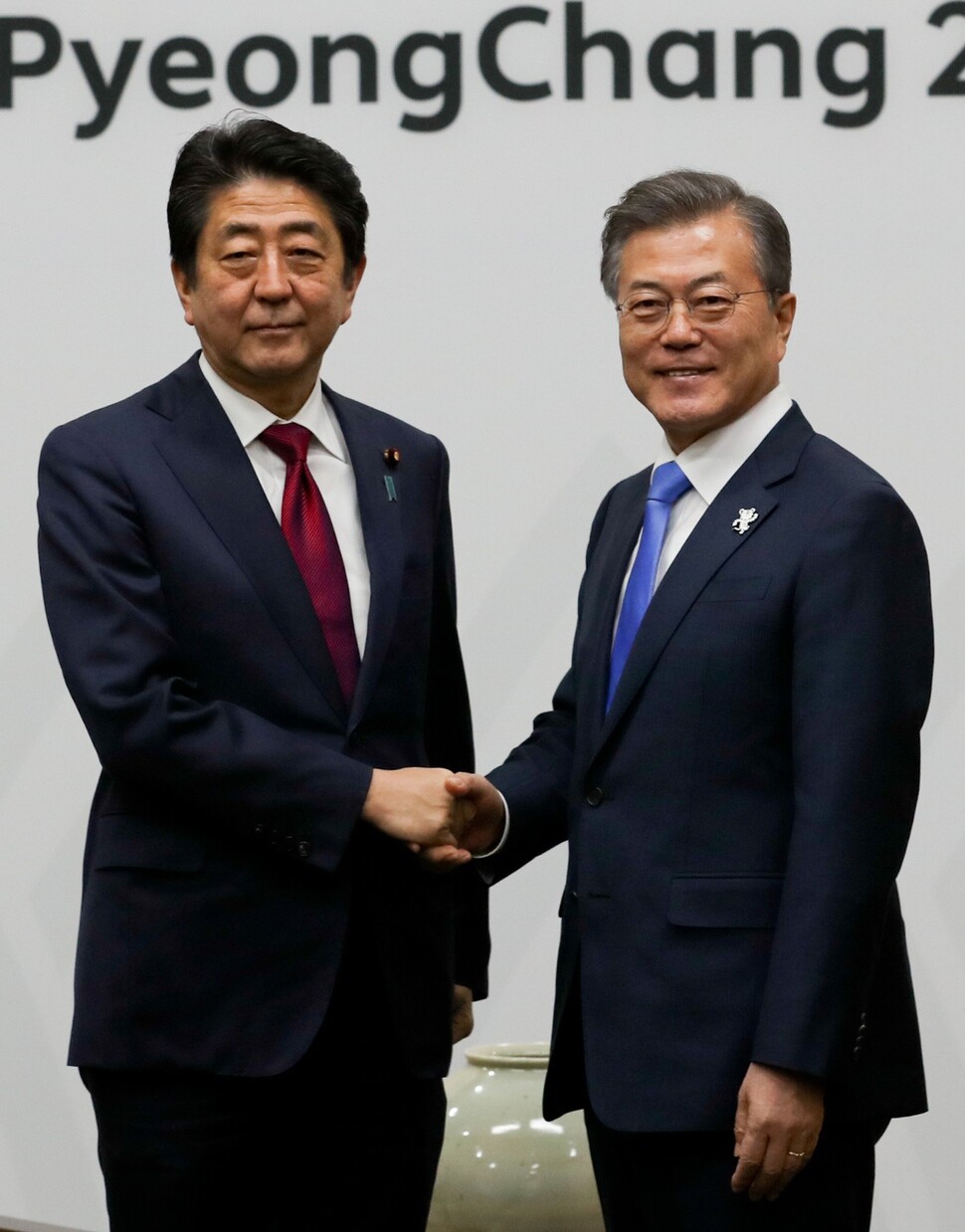hankyoreh
Links to other country sites 다른 나라 사이트 링크
Moon and Abe hold summit prior to Pyeongchang Olympics opening ceremony

During their third summit, which was held on Feb. 9, South Korean President Moon Jae-in and Japanese Prime Minister Shinzo Abe locked horns over the comfort women agreement that the two countries reached on Dec. 28, 2015. The two leaders’ position on the issues of North Korea and its nuclear program also differed in terms of emphasis, but they remained committed to improving bilateral relations as they agreed to move forward with restoring shuttle diplomacy.
Moon and Abe began their meeting, which took place at Blisshill Stay at Yongpyong Resort in Gangwon Province on the afternoon of Feb. 9, by discussing the comfort women agreement. This was the first time they had met since a South Korean Foreign Ministry task force assigned to review the agreement released its report in Dec. 2017.
After the summit, Blue House spokesperson Kim Eui-kyum told reporters that Abe had said, “According to international norms, the comfort women agreement should be upheld even by a different administration since it was an agreement between the two governments. Since Japan has accepted the agreement as final and irreversible and kept its promise, we hope that the South Korean government will keep its promise, too.”
During the meeting, Abe reportedly also asked for the removal of the comfort woman statue in front of the Japanese embassy in Seoul. Kyodo News reported that Abe had made this request while stating that “there is a diplomatic issue with the comfort woman statue in front of the Japanese embassy.”
Moon responded that “the reason we decided that the comfort women issue has not been resolved is because the former comfort women and the Korean public have not accepted the content of the agreement that was reached by the previous administration.”
According to Kim, Moon said that the comfort women issue “is not something that can be resolved through horse trading between two governments” and that “the governments of both countries need to keep working together” to find a genuine solution to the comfort women issue.
On Feb. 9, Moon appears to have reiterated his “two track” principle for dealing separately with disputes about the past and meaningful cooperation for the future. Prior to the meeting, he expressed his “sincere hope that our two countries will become true friends that understand each other” and mentioned his plan to “push for future-oriented cooperation between our two countries” while also facing history squarely.

Editorial・opinion
![[Column] Park Geun-hye déjà vu in Yoon Suk-yeol [Column] Park Geun-hye déjà vu in Yoon Suk-yeol](https://flexible.img.hani.co.kr/flexible/normal/500/300/imgdb/original/2024/0424/651713945113788.jpg) [Column] Park Geun-hye déjà vu in Yoon Suk-yeol
[Column] Park Geun-hye déjà vu in Yoon Suk-yeol![[Editorial] New weight of N. Korea’s nuclear threats makes dialogue all the more urgent [Editorial] New weight of N. Korea’s nuclear threats makes dialogue all the more urgent](https://flexible.img.hani.co.kr/flexible/normal/500/300/imgdb/original/2024/0424/7317139454662664.jpg) [Editorial] New weight of N. Korea’s nuclear threats makes dialogue all the more urgent
[Editorial] New weight of N. Korea’s nuclear threats makes dialogue all the more urgent- [Guest essay] The real reason Korea’s new right wants to dub Rhee a founding father
- [Column] ‘Choson’: Is it time we start referring to N. Korea in its own terms?
- [Editorial] Japan’s rewriting of history with Korea has gone too far
- [Column] The president’s questionable capacity for dialogue
- [Column] Are chaebol firms just pizza pies for families to divvy up as they please?
- [Column] Has Korea, too, crossed the Rubicon on China?
- [Correspondent’s column] In Japan’s alliance with US, echoes of its past alliances with UK
- [Editorial] Does Yoon think the Korean public is wrong?
Most viewed articles
- 1[Column] Park Geun-hye déjà vu in Yoon Suk-yeol
- 2[Guest essay] The real reason Korea’s new right wants to dub Rhee a founding father
- 3Why Korea shouldn’t welcome Japan’s newly beefed up defense cooperation with US
- 4[Column] ‘Choson’: Is it time we start referring to N. Korea in its own terms?
- 5Will NewJeans end up collateral damage in internal feud at K-pop juggernaut Hybe?
- 6Senior doctors cut hours, prepare to resign as government refuses to scrap medical reform plan
- 7New AI-based translation tools make their way into everyday life in Korea
- 8Thursday to mark start of resignations by senior doctors amid standoff with government
- 9N. Korean hackers breached 10 defense contractors in South for months, police say
- 10Kim Jong-un expressed ‘satisfaction’ with nuclear counterstrike drill directed at South